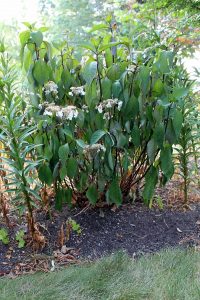By Bob Labozetta —
What can home gardeners do to help their plants — veggies, landscape plants, shrubs and trees — survive the intense summer heat?
Here are some do’s and don’ts of hot weather gardening:
Don’t fertilize plants or trees during the hot summer months. The purpose of fertilizers — especially those high in nitrogen — is to help the plants grow. This will increase the water and nutrient needs of the plant … not a good idea this time of year.
 Do water plants appropriately. How much and when to water varies depending on the plant, soil type, slope and weather. Generally, trees and shrubs with developed roots need deep, less frequent watering. Watering deeply encourages growth of deeper roots that help plants become stronger and more virile. For smaller or less established plants, roots tend to be near the surface, requiring more frequent watering in the heat of summer. Clay soils retain water and allow for less frequent watering than sandy soils. Always test your soil to determine the right conditions to water.
Do water plants appropriately. How much and when to water varies depending on the plant, soil type, slope and weather. Generally, trees and shrubs with developed roots need deep, less frequent watering. Watering deeply encourages growth of deeper roots that help plants become stronger and more virile. For smaller or less established plants, roots tend to be near the surface, requiring more frequent watering in the heat of summer. Clay soils retain water and allow for less frequent watering than sandy soils. Always test your soil to determine the right conditions to water.
Don’t introduce new plants or trees until the fall. The best time to install new perennial plants is in the fall. Let the winter rains help your plants establish a good root system.
Do pile on the mulch, mulch again and add more mulch. Melissa Womack from UC ANR suggests applying a good layer of mulch to reduce evaporation, keep the soil uniformly moist, reduce weeds, and protect the fine roots plants need to draw moisture and nutrients. Grass clippings, leaves, straw, comfrey, bark, sawdust, woodchips, shredded newspaper and cardboard will slowly decompose and add nutrients to the soil. As your mulch decomposes, add mulch.
Do use drip irrigation and/or soaker hoses. Before laying down the mulch, install drip irrigation and/or soaker hoses. This puts water where it is needed (the plants’ roots) without erosion and losing water to evaporation that comes from overhead watering.
Do limit pesticide use during hot weather. Various insects come out during hot summer months. Some are pests, but many are beneficial or benign. Learn to identify the insects in your landscape (or call the Master Gardeners for help). Incorporate plants that attract beneficial insects for natural pest control. Many pesticides volatize (turn to gas) in hot weather, which can spread to unwanted areas and be toxic to pets and humans. Carefully follow the directions on the container if you are considering pesticide use during hot weather.
Bob Labozetta is a U.C. Master Gardener, Mariposa
Visit our UCMG website
Follow us on Facebook
Listen to local interviews on KRYZ 98.5 FM
The U.C. Master Gardener Helpline and Helpdesk are staffed Thursdays from 2 – 5 p.m. Please contact the helpline, or leave a message by phone at: (209) 966-7078. By email (send photos and questions for researched answers) to: mgmariposa@ucdavis.edu
Master Gardener Office Location:
UC Cooperative Extension Office, 5009 Fairgrounds Road, Mariposa, CA 95338
Phone: (209) 966-2417
Email: mgmariposa@ucdavis.edu
Website: http://cemariposa.ucanr.edu/Master Gardener/




